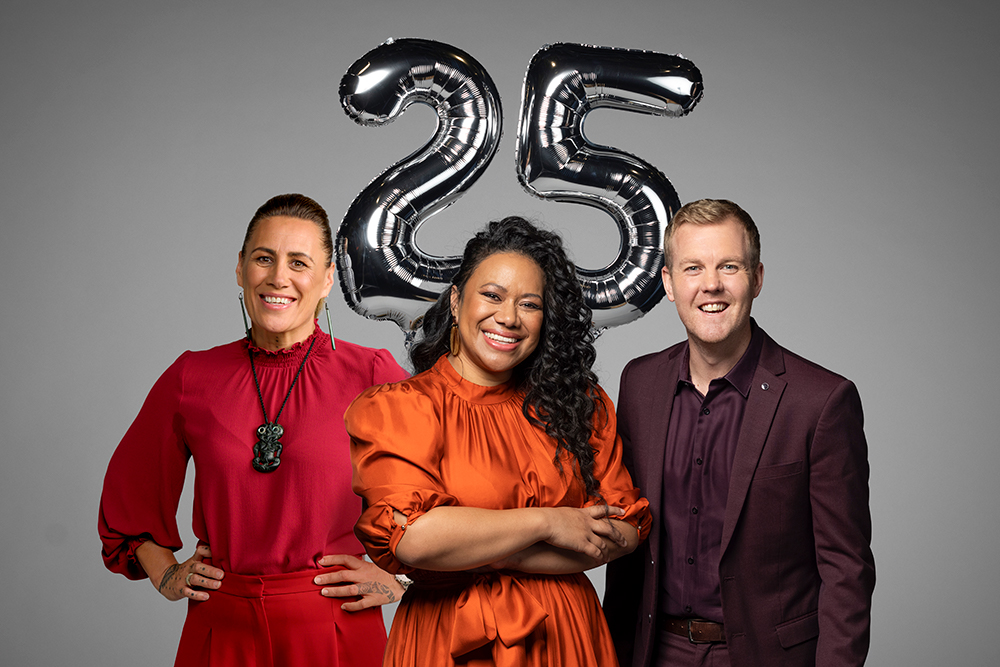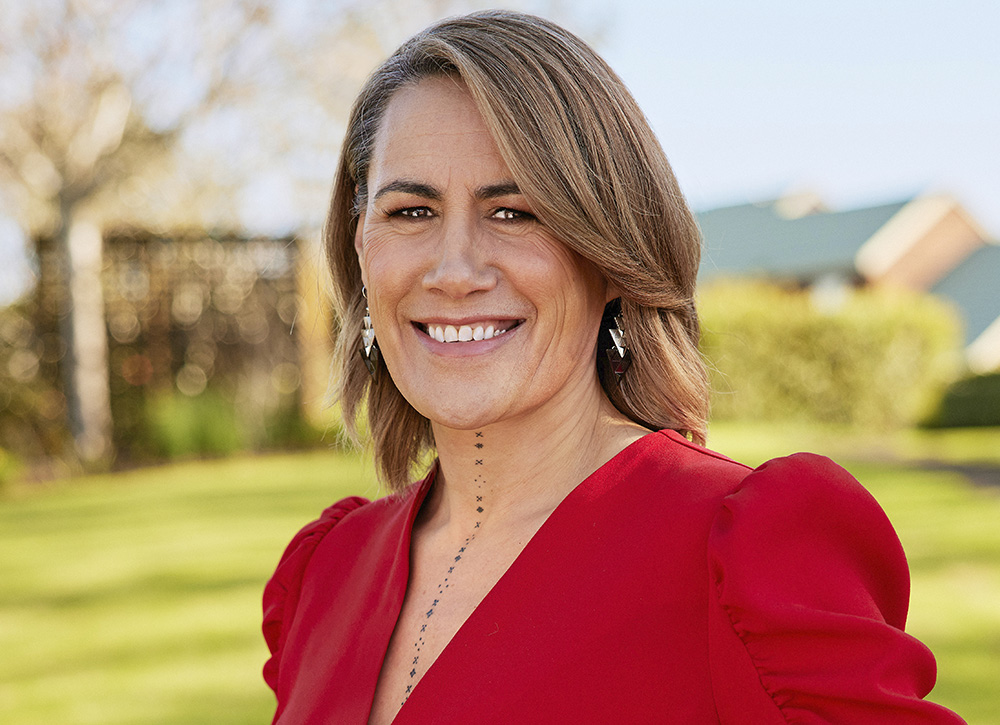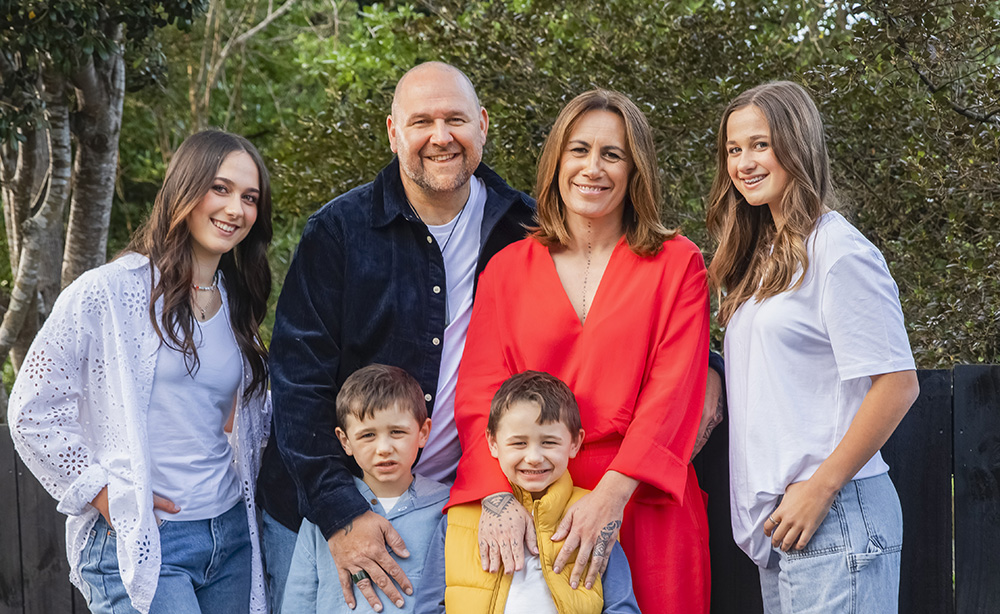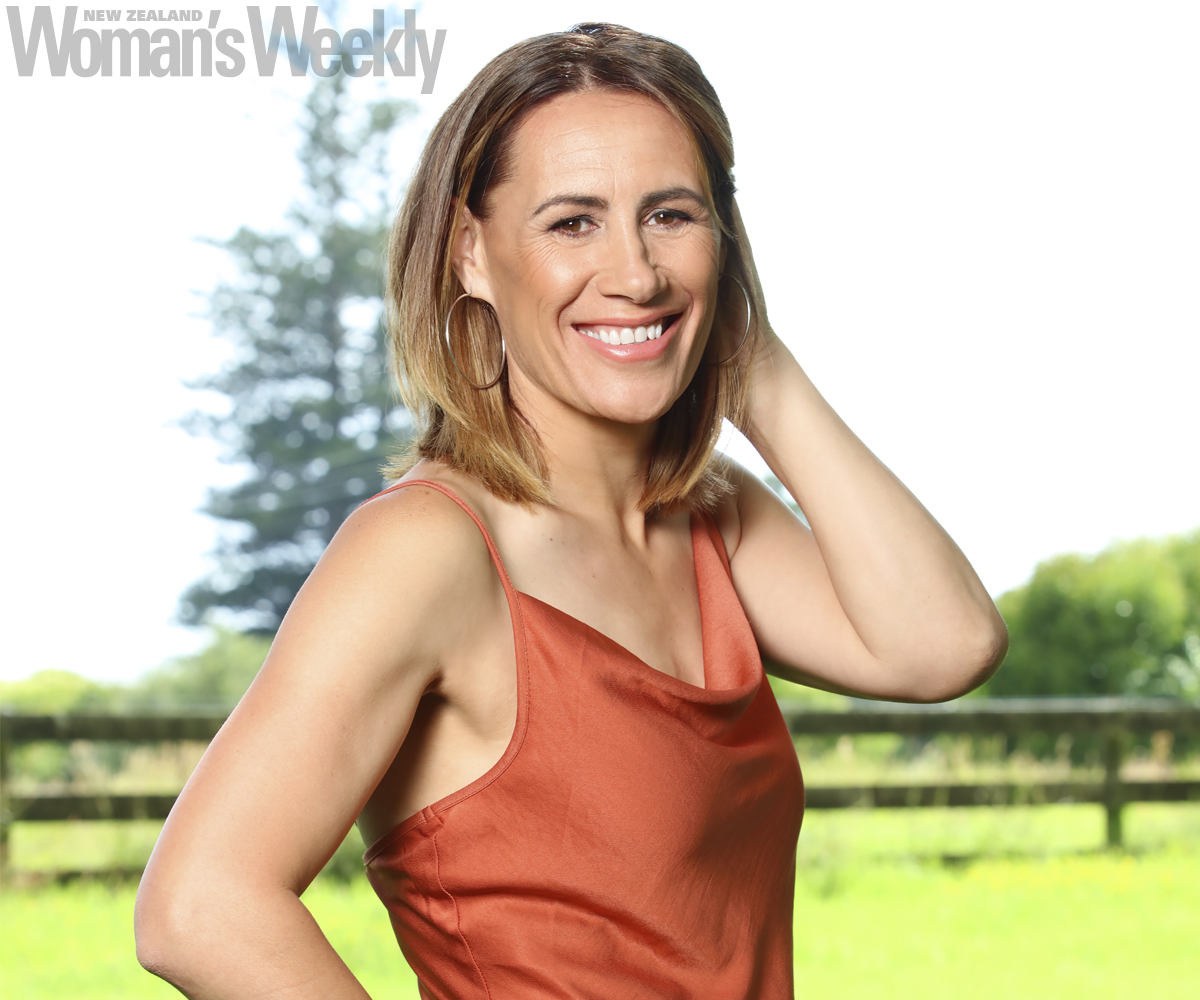Breakfast presenter Jenny-May Clarkson has one of the best stories to tell about her time on the show, which celebrates 25 years on air this week.
But it’s not an interview which went wrong or indeed an interview which went right. It’s the moment she found out she had her job on Breakfast.
“When I was offered the role, the first thing I felt was fear and then once I had moved through that process, I remember driving in the car on my own. The tears are coming back now! I remember tears rolling down my face. And I was thinking of my dad, who died four years ago, and I said, ‘Hey, Dad, how far have we come?’
“I’ve had struggles with my own journey of being Māori. But just at that moment, I realised I’m the only female Māori presenter who has done Breakfast. So, I had that moment with my dad.”

A celebration Breakfast with Indira Stewart, and Matty McLean.
Former Silver Fern Jenny-May, who is of Ngāti Maniapoto and Ngāti Kahu descent, has talked before about taking time off to do a full-time te reo Māori immersion course in 2012, just as dad Waka Coffin did in his fifties at night classes.
Now she speaks te reo Māori to her six-year-old twin boys Atawhai and Te Manahau, but says they’re only just starting to speak back to her in te reo.
“At school, they’re pretty good, particularly when they’re playing,” tells Jenny-May, whose boys attend a Kura Kaupapa Māori. “But they’ll do it when they feel like it.
“I’ve learned not to ask them to speak to me in te reo Māori, but now I hear things just drop out of their mouths and at those moments, my heart sings. They’re just choosing to annoy me, but I’m at peace with that now,” she laughs.
Jenny-May, 48, talks to the Weekly at eight in the morning, which is late for someone who gets up at 3am every day. She has no make-up on and sits in front of a wall in her home with the word “Whānau” printed on it, surrounded by pictures.
There are eight people in her household at the moment – husband Dean Clarkson, his two daughters, his mother and father, and their twins. And sometimes this means taking a few days off Breakfast to make sure things get done.

Jenny-May’s full house (from left): Leah, Atawhai, Libby-Jane, Dean, and his parents Maurice and Jocelyn with Te Manahau.
She has just said goodbye to her boys and Dean, who have flown to Australia to see their aunty and cousins, and the day after our chat, Jenny-May was flying to Birmingham to cover the Commonwealth Games for Breakfast.
“I’ve been hassling my bosses all year to do this,” she says. “Nobody was making decisions and then a few weeks ago, they’re like, ‘Off you go!’ So, no holiday for me with the whānau, but I coped quite well saying goodbye. I told myself, ‘It’s not about you, J-May. It’s about them. Goodbye!'”
When she touches down in the UK, Jenny-May will be in her happy place, reporting on sports, which is how she started in TV following her illustrious netball career. And some would say her trip is well-deserved after what has been a difficult few years for the Breakfast team. They have dealt with the pandemic, which saw them split into two groups to keep broadcasting, and more recently, their newest host Kamahl Santamaria left after just a month on air.
But Jenny-May says they have never been stronger.
“We have a great team,” she enthuses. “You don’t get up at that time of the day to go and work with people you don’t trust, because you are vulnerable on a number of levels. Whether it’s during an interview and you feel like you’ve stuffed it up, or for some reason something happens and you know you can rely on the person that’s sitting or standing next to you.
“There’s a lot of love, care, passion and compassion for one another. That’s one of the biggest things for me.”

Jenny-May says she also enjoys giving people a platform on Breakfast to tell their stories.
“I’m always grateful for people who show up on our show. You don’t have to be there. Whether it’s politicians or a homeless woman, or someone who’s working with vulnerable people, I’m glad to be able to hold that space for them, so they feel safe to tell their story.”
Part of the job of a host on Breakfast is talking to politicians and Jenny-May says it’s important to respect them, despite how you feel about them politically.
“It’s just about respect,” she explains. “We’re all human beings. Whether you like the politics or not, it’s just allowing them the space to say what they want to say.”
One interview which Jenny-May did recently has stayed with her, and has started her thinking about doing more work in the area of grief and trauma.
“This woman was labelled mentally unwell, and she had a disability and the things that were done to her were horrific,” she tells. “I want to look more into what trauma and grief look like. What it feels like and how many of us have dealt with it.”
Jenny-May lost her brother Jeffrey four years ago after a two-year battle with bowel cancer and four months after her dad Waka died.
“When I think back about being there with my brother and holding his hand for his last breath. In that moment, I just thought, ‘How beautiful is this?'”
But the trauma of those two deaths did not go away and came back in the form of panic attacks when Jenny-May would be reading the sports news on TV.
“I compartmentalise everything when things happen,” she says. “I put it in a little box and I put it to the side. And then next thing, I couldn’t do that any more.
“I’ve just done an interview for a documentary that’s coming up about anxiety and how it actually manifested itself in my panic attacks. I really enjoyed talking about it because it took me back to that time, which is really hard, but at the same time, it reminds me of the work that I haven’t done and still have to do.”
Jenny-May rarely gets panic attacks these days and she’s never been more comfortable in her role on Breakfast.
“When I first joined Breakfast in 2019, it was my impression that you had to be a personality. Then when I settled into the role, I realised people can see through you in three hours of television, Monday to Friday. And I thought, ‘I can’t be bothered any more. Being me is good enough.’ It doesn’t mean I don’t have my own struggles, it just means I don’t struggle with pretending to be something else.”

Keeping up appearances: Jenny-May has a surprise for TV viewers – she’s planning on going grey.
She says part of that realisation was needing to be authentic about being Māori.
“I’m still on that journey of discovery and to a large extent, the audience is going on that with me. In the last couple of years, whether they know it or not, they’ve been with me as I figure out that part of who I am as a Māori.”
As much as Jenny-May has never felt more comfortable in her seat at Breakfast, she also doesn’t take it for granted.
“I know I’m only warming the seat for a certain amount of time. I never forget that when I walk in the studio. There are days when it’s hard with the early starts, but it only lasts for a short time, so I tell myself to get over it and get on with it!”
Jenny-May is realistic about ageing and is planning to grow her grey hair out very soon.
“I’ve been wanting to do it for ages and they’ve finally got their head around it at TVNZ. There has never been a woman host on TV that is grey and that’s what I want to be,” she says proudly.
“But the reality is, and history tells us, I’m a woman at 48 and how much longer am I going to be doing what I’m doing? It’d be nice to think TV has moved forward enough to accept a woman at my age with grey hair on screen. And wouldn’t that be amazing if I became the first woman to do that? That would be the ultimate, right?”

Jenny-May says part of that is also showing her sons that you make your own rules and don’t allow others to dictate what you do.
“And that is also knowing when it’s time to move on. I’ve said to one of my bosses, ‘The day you start to think, J-May, your time has come, I want you to have that conversation with me before it happens.'”
Meanwhile, Jenny-May knows her father would be proud of what she is doing on Breakfast.
“I like to think something would come out of my mouth and he’d say, ‘Who do you think you are, Jenny-May? Why would you say that?’
“I’m constantly having these conversations in my head with my dad because I know he’d be rolling his eyes and saying, ‘Oh, my goodness, Jenny-May!'”


